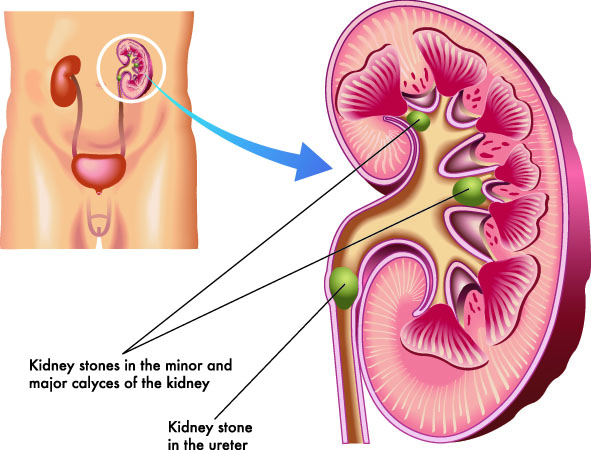Kidney Stones vs UTI: Recognizing the Overlapping Manifestations and Treatment Methods
Kidney Stones vs UTI: Recognizing the Overlapping Manifestations and Treatment Methods
Blog Article
Discovering the Manifestations and Causes of Kidney Stones in Comparison to Urinary System Tract Infections: An In-depth Guide
The expedition of kidney stones and urinary system infections (UTIs) discloses an intricate interaction of symptoms and underlying causes that warrant careful examination. What are the vital differences in their symptoms, and how might these inform therapy methods?
Summary of Kidney Stones
Kidney stones, likewise known as kidney calculi, form when certain substances in the urine crystallize and aggregate, bring about the advancement of difficult down payments within the kidneys. These rocks can vary in dimension, ranging from a grain of sand to a golf round, and can be made up of numerous products, the most common being calcium oxalate, uric acid, struvite, and cystine. The formation of kidney stones is affected by a number of variables, consisting of dietary practices, liquid consumption, and hereditary proneness.
Signs of kidney rocks may consist of severe discomfort in the back or side, blood in the pee, nausea, and constant urination, especially as the stone relocates with the urinary system tract. Medical diagnosis generally includes imaging studies such as ultrasound or CT scans, along with urinalysis to identify the stone's make-up.
Therapy choices vary based upon the size and kind of rock, along with the seriousness of symptoms (Kidney Stones vs UTI). Tiny stones might pass normally with enhanced fluid consumption, while larger stones might need clinical treatments such as lithotripsy or medical elimination. Recognizing the pathophysiology and threat aspects connected with kidney rocks is vital for effective prevention and administration
Review of Urinary Tract Infections
Urinary system infections (UTIs) are typical bacterial infections that affect any kind of component of the urinary system, including the kidneys, ureters, bladder, and urethra. They predominantly occur when germs, commonly from the intestinal tract, get in the urinary system, leading to inflammation and infection.
The frequency of UTIs is significantly greater in women than males, mainly because of physiological distinctions, such as a shorter urethra. Risk variables include sexual activity, certain contraceptive methods, urinary system retention, and dehydration. The diagnosis of UTIs is generally verified through pee examinations, which may disclose the presence of germs, white blood cells, or red cell.

Signs And Symptoms of Kidney Stones
The discomfort connected with kidney stones can show up in various methods, commonly leading people to seek clinical focus. Among one of the most typical signs and symptoms is extreme pain, commonly local in the lower back or side, which might emit to the abdomen or groin. This discomfort, often defined as sharp or cramping, can occur instantly and may rise and fall in intensity.
Additionally, individuals may experience hematuria, or blood in the pee, which can vary from microscopic amounts to visible discoloration. This sign may be accompanied by modifications in urinary system practices, such as boosted regularity or seriousness, as well as pain during peeing. Nausea or vomiting and throwing up are also common, frequently arising from the body's reaction to intense pain.
Sometimes, individuals may experience fever and chills, specifically if a second infection establishes due to the blockage caused by the rocks. Generally, the mix of serious discomfort, hematuria, transformed urinary patterns, and gastrointestinal symptoms can supply substantial insight into the visibility of kidney stones, warranting punctual medical assessment and treatment. Understanding these symptoms is important for timely diagnosis and effective administration of the condition.
Symptoms of Urinary Tract Infections
Infections within the urinary tract typically provide a range of unique signs that can considerably affect every day life. One of the most common symptoms consist of a consistent impulse to pee, usually accompanied by a burning sensation throughout urination, known as dysuria. People might additionally experience enhanced frequency of peeing, generating tiny quantities of urine each time.
Other noteworthy symptoms include cloudy or foul-smelling pee, which may show the presence of germs or pus. In some cases, urine may show up pink next page or red because of the presence of blood, a problem called hematuria. In addition, people may experience pelvic pain or stress, which can better intensify the sensation of urgency.
Systemic signs and symptoms might likewise materialize, such as high temperature, cools, and exhaustion, specifically if the infection has actually risen to the kidneys. It is vital to recognize these symptoms early, as untreated urinary system system infections can result in more serious difficulties. Kidney Stones vs UTI. Motivate clinical interest is encouraged when these signs are observed, enabling proper analysis assessment and therapy to relieve pain and avoid more health and wellness problems
Root Causes Of Each Problem
Regularly, kidney rocks and urinary tract infections occur from distinctive yet often overlapping reasons that can impact individuals in different ways. Kidney stones normally develop because of metabolic variables, dietary options, and hereditary proneness. Raised levels of calcium, oxalate, or uric acid in the urine can cause rock formation. Dehydration, insufficient fluid consumption, and high-sodium diet plans can intensify these problems, promoting formation within the urinary tract.

Comprehending these unique reasons is crucial for prevention and therapy. Kidney Stones vs UTI. While lifestyle modifications may minimize the threat of kidney stones, ideal health and timely therapy of urinary system infections are important for reducing their reoccurrence and associated difficulties
Conclusion
In summary, kidney stones and urinary system system infections present unique symptoms and underlying causes. Kidney stones are identified by severe pain and metabolic elements, while urinary system tract infections primarily entail bacterial infections important site leading to urinary urgency and pain.
The exploration of kidney rocks and urinary tract infections (UTIs) exposes a complicated interplay of signs and symptoms and underlying causes that necessitate mindful evaluation.Urinary system infections (UTIs) are common bacterial infections that influence any component of the urinary system, including the kidneys, ureters, bladder, and urethra.Frequently, kidney rocks and urinary system infections emerge from unique yet sometimes overlapping causes that can influence people in different ways.In summary, kidney stones and urinary system tract infections existing unique signs and symptoms and underlying causes. Kidney stones are characterized by extreme pain and metabolic factors, while urinary tract infections mainly include bacterial infections leading to urinary necessity and discomfort.
Report this page